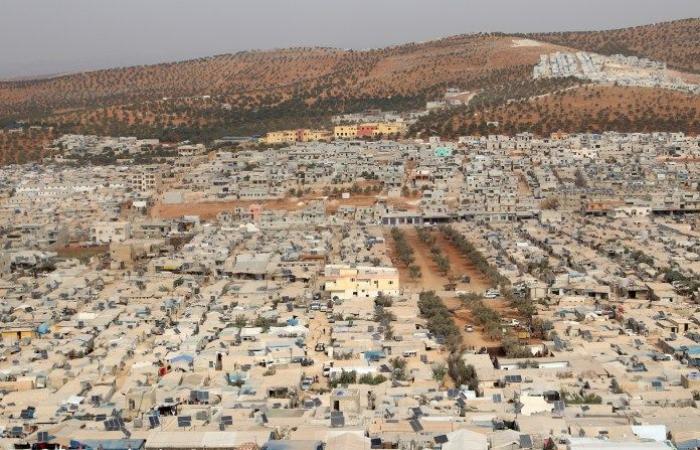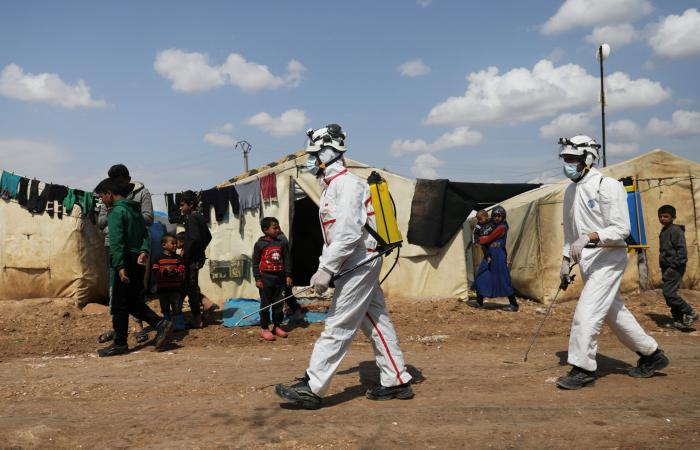Corona increases the suffering of the Syrians
Despite the opacity practiced by the Syrian regime, it has not been able to hide the scale of the worsening outbreak of the new Corona virus, amid the inability of the medical apparatus even to treat the symptoms caused by Covid-19 disease.The director of the Syrian Observatory for Human Rights, Rami Abdul-Rahman, said, on Sunday, in response to the inquiries of the Al-Hurra website, that the Corona virus is widely spread in the regime-affiliated areas.
He added that the medical device is not able to cope with the symptoms associated with this deadly virus, and many doctors resort to not diagnosing those infected with the virus as Corona, and they claim to have other chest diseases, such as pneumonia, or try to convince them that it is a symptom of regular influenza.
Abdul Rahman indicated that the increase in the number of injured people is due to three reasons, firstly: the media blackout practiced by the regime, second: the weakness of the medical apparatus, and third: the system’s failure to solve the problem of overcrowding that occurs during the gathering of citizens to buy basic foodstuffs, which have become either missing or high. The price.
He emphasized that there are deaths among the officers of Damascus, and even doctors in hospitals, but the regime is trying to hide any of this information, especially after it announced the death of Muhammad Makhlouf, the uncle of the Syrian President, Bashar al-Assad, with the virus.
At least 6,200 cases of Coronavirus were recorded during the past few days, and nearly 300 deaths, in the regime-held areas, according to the observatory.
The Observatory quoted reliable medical sources that the number of people infected with Corona is close to 50 thousand people, of whom about 12 thousand have recovered, and more than 2,600 people have died, and these numbers are mainly focused on Aleppo, Damascus and its countryside.
Lost luxury
With the increase in the number of HIV infections in northwestern Syria, Hassan Sweidan is afraid to go to the hospital to monitor his health and finds himself stuck in a crowded camp for displaced people with the inability to take the most basic prevention measures, according to a report published by Agence France-Presse.
Since the start of the spread of Covid-19 in Idlib, humanitarian organizations have expressed their fear of a “health catastrophe” if the virus breaks out in hundreds of camps for displaced people spread along the borders between Idlib governorate and Turkey.
The displaced communities lack basic services such as water and sanitation networks, and washing hands or bathing seems to be a luxury or a luxury that many cannot obtain.
In one of those camps, Sweidan, who has been displaced for years from north of Hama, says: “We live in tents close together.
Sweidan, who is in his forties and father of six, has been suffering from liver cirrhosis for years, which raises his fear more than infection with corona, with his need to monitor his condition in the hospital.
“Here in the camps we cannot quarantine ourselves, and the hospital is basically overcrowded,” he explains from inside a modest room with concrete walls and covered with a plastic sheet. “One of us is afraid of contact with doctors and nurses in order to avoid injury.”
“One of our relatives was injured a while ago, so I am very afraid because I have no immunity,” he says.
The areas controlled by the Headquarters for the Liberation of Al-Sham in Idlib and the areas controlled by the Turkish forces and the opposition factions loyal to them in northern Aleppo recently witnessed an increase in the number of HIV infections.
The Health Directorate, affiliated with the Syrian opposition and supervising the health situation in the two regions, recorded more than five thousand injuries and at least 42 deaths.
And after the region used to record dozens of cases daily, the injuries sometimes exceeded 300.
During a press conference Wednesday, the District Health Directorate reported that more than 860 cases were recorded among medical personnel and about 330 injuries in the camps.
The 80-year-old Ghawa Al-Muhammed spreads on the ground and is busy piling olives one by one.
And she says, “We were confused about what to do,” before adding, in the spoken tone, “If God would die and comfort us.”
Almost impossible
During a speech to the UN Security Council, the UN Assistant Secretary-General for Humanitarian Affairs, Mark Lowcock, said: “The number of casualties in northwestern Syria increased six times in a month, and they also increased in the camps for the displaced.”
The rise in the infection meter comes after an increase in the percentage of virus detection tests, with the United Nations providing the region with two additional laboratories in Afrin and Jarablus in northern Aleppo, in addition to the main laboratory in Idlib.
The areas controlled by the Headquarters for the Liberation of Al-Sham in Idlib and its environs harbor about three million people, half of whom are displaced persons who live in more than a thousand camps in northwestern Syria, according to the United Nations.
Given the overcrowding in northwestern Syria, the United Nations Office for the Coordination of Humanitarian Affairs indicated that “the main challenge facing the Covid-19 epidemic is the difficulty of isolating people.”
In the Health Directorate building in the city of Idlib, the doctor, Yahya Nehme, told AFP, “We hold the regime forces and Russia responsible for the tragic situation that the displaced are suffering from after their displacement, after overpopulation has been imposed on them in the camps.”
Several attacks launched by the regime forces, with Russian support, have caused hundreds of thousands of people to flee their homes and seek refuge in camps in northern Idlib, the last of which was a three-month attack, at the beginning of this year, which pushed about a million people to flee, of whom only about 235,000 returned to their areas, most of them after an agreement. To cease fire.
The Health Directorate asked the residents to adhere to social distancing, according to Nehme, who added, “This is almost impossible.”
Despite their awareness of the necessary preventive measures, few in the camp wear masks, so there is no ability to buy and change them from time to time or to buy sterilization materials.
The displaced mainly depend on aid to secure food, water, and access to hospital and educational services for their children.
Muhammad al-Omar, 40, who was displaced eight years ago from the southern countryside of Idlib and father of four children, said, “They tell us not to go out and do not cause traffic jams, and we live in camps half a meter apart from the other tent.”
“Give each of us over the age of five years one mask, as it is sufficient, and it is not enough,” he explains.
Al-Omar, who works as a water tanker driver, cannot stay in the tent, as he has to go out every day to search for his livelihood in an area that, like other Syrian regions, witnesses a rise in food prices.
It is also worth noting that the original news has been published and is available at saudi24news and the editorial team at AlKhaleej Today has confirmed it and it has been modified, and it may have been completely transferred or quoted from it and you can read and follow this news from its main source.
Source: Corona increases the suffering of the Syrians and the regime is…



